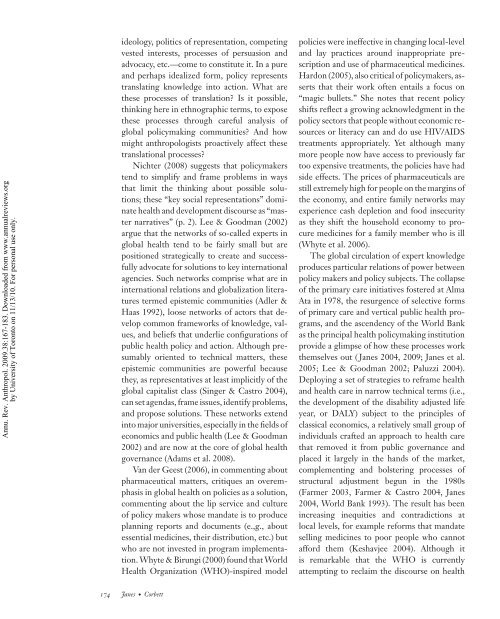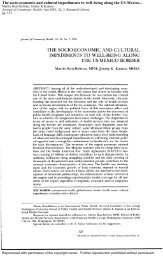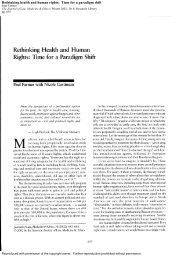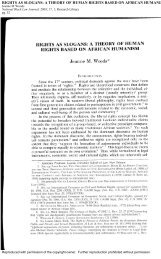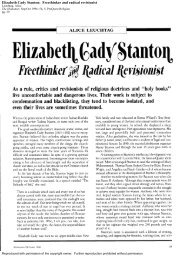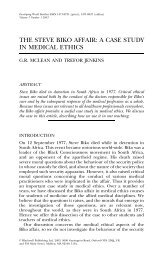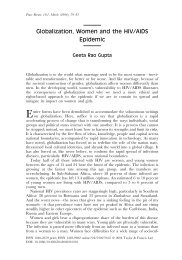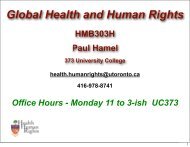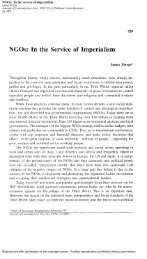Anthropology and Global Health - Human Biology - University of ...
Anthropology and Global Health - Human Biology - University of ...
Anthropology and Global Health - Human Biology - University of ...
You also want an ePaper? Increase the reach of your titles
YUMPU automatically turns print PDFs into web optimized ePapers that Google loves.
Annu. Rev. Anthropol. 2009.38:167-183. Downloaded from www.annualreviews.org<br />
by <strong>University</strong> <strong>of</strong> Toronto on 11/13/10. For personal use only.<br />
ideology, politics <strong>of</strong> representation, competing<br />
vested interests, processes <strong>of</strong> persuasion <strong>and</strong><br />
advocacy, etc.—come to constitute it. In a pure<br />
<strong>and</strong> perhaps idealized form, policy represents<br />
translating knowledge into action. What are<br />
these processes <strong>of</strong> translation? Is it possible,<br />
thinking here in ethnographic terms, to expose<br />
these processes through careful analysis <strong>of</strong><br />
global policymaking communities? And how<br />
might anthropologists proactively affect these<br />
translational processes?<br />
Nichter (2008) suggests that policymakers<br />
tend to simplify <strong>and</strong> frame problems in ways<br />
that limit the thinking about possible solutions;<br />
these “key social representations” dominate<br />
health <strong>and</strong> development discourse as “master<br />
narratives” (p. 2). Lee & Goodman (2002)<br />
argue that the networks <strong>of</strong> so-called experts in<br />
global health tend to be fairly small but are<br />
positioned strategically to create <strong>and</strong> successfully<br />
advocate for solutions to key international<br />
agencies. Such networks comprise what are in<br />
international relations <strong>and</strong> globalization literatures<br />
termed epistemic communities (Adler &<br />
Haas 1992), loose networks <strong>of</strong> actors that develop<br />
common frameworks <strong>of</strong> knowledge, values,<br />
<strong>and</strong> beliefs that underlie configurations <strong>of</strong><br />
public health policy <strong>and</strong> action. Although presumably<br />
oriented to technical matters, these<br />
epistemic communities are powerful because<br />
they, as representatives at least implicitly <strong>of</strong> the<br />
global capitalist class (Singer & Castro 2004),<br />
can set agendas, frame issues, identify problems,<br />
<strong>and</strong> propose solutions. These networks extend<br />
into major universities, especially in the fields <strong>of</strong><br />
economics <strong>and</strong> public health (Lee & Goodman<br />
2002) <strong>and</strong> are now at the core <strong>of</strong> global health<br />
governance (Adams et al. 2008).<br />
Van der Geest (2006), in commenting about<br />
pharmaceutical matters, critiques an overemphasis<br />
in global health on policies as a solution,<br />
commenting about the lip service <strong>and</strong> culture<br />
<strong>of</strong> policy makers whose m<strong>and</strong>ate is to produce<br />
planning reports <strong>and</strong> documents (e.,g., about<br />
essential medicines, their distribution, etc.) but<br />
who are not invested in program implementation.<br />
Whyte & Birungi (2000) found that World<br />
<strong>Health</strong> Organization (WHO)-inspired model<br />
policies were ineffective in changing local-level<br />
<strong>and</strong> lay practices around inappropriate prescription<br />
<strong>and</strong> use <strong>of</strong> pharmaceutical medicines.<br />
Hardon (2005), also critical <strong>of</strong> policymakers, asserts<br />
that their work <strong>of</strong>ten entails a focus on<br />
“magic bullets.” She notes that recent policy<br />
shifts reflect a growing acknowledgment in the<br />
policy sectors that people without economic resources<br />
or literacy can <strong>and</strong> do use HIV/AIDS<br />
treatments appropriately. Yet although many<br />
more people now have access to previously far<br />
too expensive treatments, the policies have had<br />
side effects. The prices <strong>of</strong> pharmaceuticals are<br />
still extremely high for people on the margins <strong>of</strong><br />
the economy, <strong>and</strong> entire family networks may<br />
experience cash depletion <strong>and</strong> food insecurity<br />
as they shift the household economy to procure<br />
medicines for a family member who is ill<br />
(Whyte et al. 2006).<br />
The global circulation <strong>of</strong> expert knowledge<br />
produces particular relations <strong>of</strong> power between<br />
policy makers <strong>and</strong> policy subjects. The collapse<br />
<strong>of</strong> the primary care initiatives fostered at Alma<br />
Ata in 1978, the resurgence <strong>of</strong> selective forms<br />
<strong>of</strong> primary care <strong>and</strong> vertical public health programs,<br />
<strong>and</strong> the ascendency <strong>of</strong> the World Bank<br />
as the principal health policymaking institution<br />
provide a glimpse <strong>of</strong> how these processes work<br />
themselves out ( Janes 2004, 2009; Janes et al.<br />
2005; Lee & Goodman 2002; Paluzzi 2004).<br />
Deploying a set <strong>of</strong> strategies to reframe health<br />
<strong>and</strong> health care in narrow technical terms (i.e.,<br />
the development <strong>of</strong> the disability adjusted life<br />
year, or DALY) subject to the principles <strong>of</strong><br />
classical economics, a relatively small group <strong>of</strong><br />
individuals crafted an approach to health care<br />
that removed it from public governance <strong>and</strong><br />
placed it largely in the h<strong>and</strong>s <strong>of</strong> the market,<br />
complementing <strong>and</strong> bolstering processes <strong>of</strong><br />
structural adjustment begun in the 1980s<br />
(Farmer 2003, Farmer & Castro 2004, Janes<br />
2004, World Bank 1993). The result has been<br />
increasing inequities <strong>and</strong> contradictions at<br />
local levels, for example reforms that m<strong>and</strong>ate<br />
selling medicines to poor people who cannot<br />
afford them (Keshavjee 2004). Although it<br />
is remarkable that the WHO is currently<br />
attempting to reclaim the discourse on health<br />
174 Janes·Corbett


